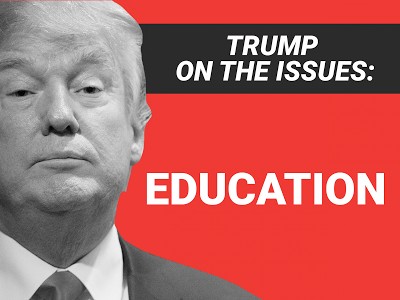7 Areas You'll See Less of With A #TrumpEducation Administration

Tools and ideas to transform education. Sign up below.
You are now subscribed
Your newsletter sign-up was successful
Photo Credit: Business Insider. Where Trump Stands On Education.

Note: Twitter won't let you Tweet my blog url. Please use this shortened url instead http://tinyurl.com/WhatATrumpEducationMeansLessOf
Who knew? I certainly hadn’t noticed that Trump has been sharing ideas about education since the turn of the century starting with The America We Deserve, where he wrote about citizenship education, teachers unions, and school safety. Ten years later, in Think Like a Champion, he touched on American history and comprehensive education.
Most recently, in 2015, Trump published Great Again: How to Fix Our Crippled America where he lays out specific policy in a number of areas including education.
Those three books, along with dozens of articles and videos from and about what Trump wants for education, point to a number of things you'll see less of during a Trump presidency. Here they are.
7 areas you'll see less of with a #TrumpEducation:
1. Common Core Standards
"Education has to be run locally. Common Core, No Child Left Behind, and Race to the Top are all programs that take decisions away from parents and local school boards. These programs allow the progressives in the Department of Education to indoctrinate, not educate, our kids. What they are doing does not fit the American model of governance" - Great Again Here is what Trump said on Facebook. Donald J. TrumpJanuary 26 I will end common core. It's a disaster. #MakeAmericaGreatAgain#Trump2016 Watch the video at this link.
2. Department of Education
"A lot of people believe the Department of Education should just be eliminated. Get rid of it. If we don't eliminate it completely, we certainly need to cut its power and reach." - Great Again Vice president-elect Mike Pence agrees. The New York Times reports that he cast one of just 25 Republican votes against then-President George W. Bush’s signature No Child Left Behind education law in 2001, raising concerns about federal intrusion into local education decisions.
Tools and ideas to transform education. Sign up below.
3. Standardized testing
“Making teachers accountable is important, but we should stop measuring their performance with mindless standardized tests. We should be embracing success stories and using them as a model for improving the others.” - Great Again
4. College readiness
While Trump will certainly value college readiness for careers that demand that, he understands there are other paths and will not force everyone down this one path as previous administrations have done.
Pence shared he feels the same way. Chalkbeat Indiana reported that, “His main push has been to improve career and technical education programs.” They go on to say that, Pence feels we are too focused on trying to prepare all children for college and have let slip programs that prepared high school graduates to go directly to work in good paying jobs that did not necessarily require college.
Chris Arnade explains in the Guardian that “America changed its longstanding ugly racial hierarchy, removing legal barriers, but the result was a playing field that was anything but level. That system was replaced with one based on schooling, tilted toward anyone with the “right” education. The jobs requiring muscle decreased (many going overseas) while the jobs requiring school increased. Compounding the pain from this, we started giving the winners a much larger share of the profits.”
Donald Trump’s own father succeeded without a college degree. Trump showed that he really saw and heard a part of the country who had their livelihood wiped out from under them because of their education status. He understands that success can be returned to those whose livelihood does not require a degree and has dialed into the need for those workers.
5. Traditional Government Schools
Frederick Hess, director of education policy studies at American Education Institute and editor at Education Next reminds us that “Personnel is policy.” To that end, Trump’s top pick for education advisor is pediatric neurosurgeon Ben Carson who has stated that he believes that the best education is home education, followed by private schools, then charter schools, then traditional government schools.
Trump’s Education plan indicates he will, “Establish the national goal of providing school choice to every one of the 11 million school aged children living in poverty.” As shared in the New York Times, September 2016 Trump explained that “As president, I will establish the national goal of providing school choice to every American child living in poverty. If we can put a man on the moon, dig out the Panama Canal and win two world wars, then I have no doubt that we as a nation can provide school choice to every disadvantaged child in America.”
Trump's plan to spend on school choice will allow federal dollars to follow students to whatever school parents enroll them in — public, charter, or private (which includes religious schools and in many states includes homeschooling). As a result we will see students flowing out of traditional government schools and into these other learning environments.
6. Student unemployment
We will see less student unemployment because Trump will hold schools accountable not by standardized test scores, but by the ability of their graduates to find work. If they don’t, secondary schools could lose funding opportunities and colleges will share in the responsibility of student loans for students who don't find adequate employment. This gives schools incentive to ensure their students will have jobs when they leave school or the school will have to pay the price. This means schools will need to move beyond the status quo and innovate. This may mean by forging alliances with corporations, the military, and community organizations that could provide employment. It may also mean a resurgence of internships and apprenticeships that are popular with models such as Big Picture Learning where all students work while in secondary school. It may also mean we will see more of the Schoolwide Enrichment Model where students start developing their passions, talents, and interests in partnership with community organizations in primary school.
7. Student debt
Sam Clovis, the national co-chair and policy director of Trump's campaign, outlined for Inside Higher Ed Trump’s stand that, all colleges should have "skin in the game" and share the risk associated with student loans. “A four-year degree today can be expensive enough to create six-figure debt. We can't forgive these loans, but we should take steps to help students…. There is no reason the federal government should profit from student loans.…These student loans are probably one of the only things that the government shouldn't make money from, and yet it does….Those loans should be viewed as an investment in America's future.” Great Again.
What do you think? Agree? Disagree?
Want to know the seven areas you’re likely to see more of with a #TrumpEducation? Stay tuned for my next post,where I’ll share the insights I have uncovered after spending dozens of hours obsessively combing through what has been said by and about Trump in regards to what he believes will make American education great again.
Lisa Nielsen writes for and speaks to audiences across the globe about learning innovatively and is frequently covered by local and national media for her views on “Passion (not data) Driven Learning,” "Thinking Outside the Ban" to harness the power of technology for learning, and using the power of social media to provide a voice to educators and students. Ms. Nielsen has worked for more than a decade in various capacities to support learning in real and innovative ways that will prepare students for success. In addition to her award-winning blog, The Innovative Educator, Ms. Nielsen’s writing is featured in places such as Huffington Post, Tech & Learning, ISTE Connects, ASCD Wholechild, MindShift, Leading & Learning, The Unplugged Mom, and is the author the book Teaching Generation Text.
Disclaimer: The information shared here is strictly that of the author and does not reflect the opinions or endorsement of her employer.
Lisa Nielsen (@InnovativeEdu) has worked as a public-school educator and administrator since 1997. She is a prolific writer best known for her award-winning blog, The Innovative Educator. Nielsen is the author of several books and her writing has been featured in media outlets such as The New York Times, The Wall Street Journal, and Tech & Learning.
Disclaimer: The information shared here is strictly that of the author and does not reflect the opinions or endorsement of her employer.
